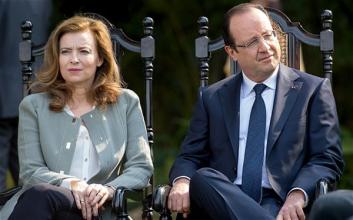法國經濟政策
Which way for Mr Hollande?
奧朗德何去何從?
Elected on the left,France’s president seems to be veering towards the centre
左翼當選,而今法國總統似向中間搖擺
THE longer Francois Hollande spends in office, the more it takes sharp eyesight and a clear head to follow his economic policy. Since his election last May, the Socialist president has mixed tax-and-spend measures with efforts to improve competitiveness. The rich feel squeezed; firms are annoyed by anti-business talk. Yet,with GDP shrinking in the fourth quarter of 2012 and job losses mounting, the man elected on a leftist programme is accused of a swerve to the reformist centre. What is Mr Hollande up to?
奧朗德任職時間越長,他的經濟政策就越發撲朔迷離。自從去年五月當選以來,這位社會黨主席就一直采用量入為出的手段并輔以促進競爭的不懈努力。富人感到備受壓迫;反商業會談讓公司惱怒不堪。然而,隨著2012年第四季度GDP的縮水以及失業人數的增加,人們質疑這位因左派綱領當選的人向改革的中間方向搖擺。奧朗德先生該何去何從?

In his first few months he ticked off items on his manifesto. He lowered the pension age for certain workers. He raised a family benefit. He capped petrol prices. He vowed to stop companies closing factories. He prepared a budget for 2013 that tried to keep the budget deficit to 3% of GDP, but chiefly through tax increases: it soaked the rich with a 75% income-tax rate, and hit companies and individuals with other higher taxes. Returning from his summer break, Mr Hollande seemed like a man with the luxury of time on his side.
在上任之初的幾個月內,他兌現了之前宣言上的條目。他降低了一些工人領養老金的年齡。他增加了家庭收入。他設置了油價上限。他誓言會阻止公司關閉工廠。他計劃將2013年的預算赤字降低到GDP的3%,但主要的手段是增加稅收:75%的所得稅壓得富人喘不過氣,而公司和個人也遭遇其他苛稅。結束了夏季休假的奧朗德有充裕的時間大展宏圖。
What followed in October was, therefore, sprung on an unsuspecting public. After a damning report on French competitiveness by Louis Gallois, a left-leaning industrialist, Mr Hollande announced 20 billion euros of tax breaks for companies employing low-wage labour, to compensate for high social charges. A sense of urgency and realism began to creep in. Mr Gallois talked of an “emergency situation”. For the first time, the government acknowledged labour cost as a factor behindFrance’s loss of competitiveness to Germany over the past ten years. Mr Hollande even started talking of cutting public spending, which accounts for over 56% of GDP. This was followed in January by an unexpected agreement with the unions to soften labour-market rules, making it easier for companies to reduce hours and wages in a downturn.
是以,在十月份接踵而至的事,讓不知情的群眾為之一震。在路易斯加洛伊斯,一位左傾實業家,發表了一份報告譴責法國的競爭力,此后,奧朗德宣布給予雇傭低薪勞動力的公司200億歐元的稅收減免以補償高額的社會負擔費用。緊迫感與現實主義暗潮洶涌。加洛伊斯認為“事態緊急”。政府前所未有地承認勞動力成本是導致過去十年間法國競爭力遜于德國的一個因素。奧朗德甚至開始考慮削減公眾開支,而這占到了GDP的56%以上。緊接著的一月,法國出人意料地和工會達成了寬松勞動市場規則的協定,讓公司能更輕松地減少工作時間和工資。
In some ways, all this was just an inevitable encounter with economic reality. Mr Hollande had based his manifes to on growth in 2013 of 1.7%; in office, he revised this to 0.8%. Now the fantasy is over: this week Mr Hollande conceded, like most economists, that growth would be much lower. As a result, said the Cour des Comptes, the national auditor, in its annual report on February 12th, France has “little chance” of meeting its 3% target.
在某種程度上,這一切只是無可避免地撞上了經濟現狀的高墻而已。奧朗德的競選綱領建立在2013年經濟增長1.7%的目標上;任職后,他把這個數字修正為0.8%。現在,美夢破碎,本周奧朗德一如眾多經濟學家般承認,增長率會低得多。而最后的結果,就像國家審計員Cour des Comptes在2月12日的年報中所說的那樣,法國實現3%赤字目標的可能性“微乎其微”。
Across the country, factories have been closing. Industrial production has stalled. Entrepreneurs feel penalised. Investment plans are on hold. Anecdotes abound of rich families leaving the country. Faced with this, and with poor poll ratings, Mr Hollande has begun to recognise the limits of state power, and of a tax-and-spend policy in a country that breaks records for both. Now Jean-Marc Ayrault, his prime minister, wants “to reinvent the French model”. Pierre Moscovici, the finance minister, even claims there has been a “Copernican revolution” on the left. By conceding the need for supply-side measures to reduce labour costs, he says, the French left has made a big shift. Indeed. Some say that those around Mr Hollande in charge of economic policy, including Mr Moscovici, Michel Sapin, the labour minister, and Emmanuel Macron, the economic adviser in the Elysee, have long understood what is really needed to solve France’s competitiveness problem.
縱觀全國,工廠紛紛關閉。工業生產陷入泥潭。企業家感覺受到嚴懲。投資計劃擱置了。人們耳邊充斥著富裕家庭離開國家的消息。面對這一切窘境還有消極的民調,奧朗德開始意識到政權以及量入為出政策的局限性。現在,總理讓-馬克·艾羅想要“重塑法蘭西模式”。財政大臣皮耶爾 莫斯科維奇 甚至宣稱左翼已經歷“哥白尼式的變革”。他表示,通過滿足供應方降低勞動力成本的需求,法國左翼已經完成巨大的轉變。一些人認為在奧朗德身邊掌控經濟政策的人士,包括莫斯科維奇,勞務大臣米歇爾薩賓以及Elysee的經濟顧問艾米努爾馬克倫早已洞悉解決法國競爭力頑疾的良藥。
The trouble is that the rest of the Socialist Party, particularly in parliament, does not agree. Manuel Valls, the popular straight-talking interior minister, says that “The challenge for the French left is that we should have done this ideological metamorphosis during the past ten years of opposition.” Instead, “We are adapting our software while in office.” With its deputies supplied largely by the public sector, this is awkward. Already, the left accuses Mr Hollande of giving in to “neo-liberal principles”. Thierry Lepaon, the new leader of the Confederation Generale du Travail, France’s biggest and communist-linked union, complains that he is doing “the opposite of his campaign commitments”.
問題是社會黨的剩余部眾,尤其是在國會的那些人,并不同意。以直言著稱的內務大臣馬努爾 沃爾斯表示“對法國左翼而言,挑戰是,我們應該在過去在野的十年內完成這種意識形態的變革”,但事實上,“我們上臺之后仍在調整適應。”它的代表人主要是由公共部門提供產生的,這確實很尷尬。的左派已經控訴奧朗德向“新自由主義原則”讓步。法國最大的共產主義工會,法國總工會的新領袖西里 萊帕昂抱怨道,奧朗德正和他的“競選承諾背道而馳”。
In reality, it is hard to detect a linear evolution, let alone a revolution. For one thing, Mr Hollande is a political animal who plays by the rule that it is better not to say too clearly what you are doing. He refuses to acknowledge a U-turn. He let Arnaud Montebourg, his industry minister, talk of the compulsory nationalisation of a steelworks, before ruling it out. He has pinned himself into a corner over the 75% tax rate, which was ruled unconstitutional in December, but which he cannot entirely bury without losing face.
事實上,線性的演變都很難觀測到,更不用說是一場巨大變革。一方面,奧朗德是一個政治動物,他不會把自己的底牌攤出來。他拒絕承認經濟的U形復蘇。他讓工業首相Arnaud Montebourg談道強制鋼鐵制品的國有化,緊接著又否決了這種可能性。他用75%的稅率把自己逼入困境,而這一稅率在十二月被判為違反憲法,而他也不能自圓其說,不失顏面地平息事態。
It is also far from clear that Mr Hollande, even if he sees the need to curb public spending, is ready to do it. In its damning report, the Cour des Comptes deplores the fact that tax rises make up three-quarters of 2013 budget savings, and urges a greater effort to cut spending. But this will require an overhaul of pensions and welfare spending, as well as civil-service staffing, none of which is on the table.
而且,即使奧朗德看出有必要控制公共支出,也很難說他已經做好準備。在譴責報告中,Cour des Comptes 強烈反對稅收增長占到2013年預算儲蓄的四分之三,并督促投入更大努力削減開支。但這意味著在養老金,福利支出以及公務員職務等方面會有大幅調整,而這樣的調整并不在議程上。
Mr Hollande could yet turn out to be a Gerhard Schruder a la francaise, willing to bring in deep reforms, as the former centre-left German chancellor did, to shake up the French welfare state and restore competitiveness. But a more likely outcome is that he will do just enough to keep the markets and the ratings agencies at bay, without ever fully confronting vested interests. “Whenever he can avoid hard choices, he will,” says somebody who knows him well. This may keep France from disaster. Whether it will reverse the slow decline of the past decade is far less certain.
奧朗德可以成為法國的杰哈德施羅德,正如這位德國前總理所做的一樣,他銳意進取,深化改革,改造社會福利,重塑國家競爭力。但另一種呼之欲出的結果是,他讓市場與評級機構陷入泥潭,卻沒有和既得利益集團交鋒。熟知他的人說,“他會盡其所能,避免”這也許能讓法國免遭滅頂之災。它是否能扭轉過去十年間的緩慢滑坡尚不得而知。 翻譯:袁航












